Southern Cone Conservation Leadership Initiative
The Southern Cone Conservation Leadership Initiative (SCCL) is an interdisciplinary initiative of UF's Tropical Conservation and Development Program (TCD) that promotes development of future conservation leaders in southern South America and advances biodiversity conservation, management of parks and reserves, and sustainable resource use in this region.
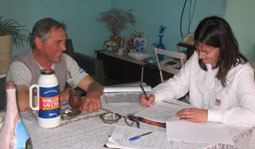 The Southern Cone of South America, comprised of Argentina, Chile, Paraguay, and Uruguay, has a spectacular diversity of landscapes and fish and wildlife resources, many of which are severely threaten by human activities. At the same time, the economic base of Southern Cone countries depends on natural resources – productive grazing lands, water and soils for agriculture, national parks, and abundant fisheries resources. The conservation challenges facing the Southern Cone are greatly exacerbated by a shortage of trained conservationists to address these complex and rapidly growing challenges.
The Southern Cone of South America, comprised of Argentina, Chile, Paraguay, and Uruguay, has a spectacular diversity of landscapes and fish and wildlife resources, many of which are severely threaten by human activities. At the same time, the economic base of Southern Cone countries depends on natural resources – productive grazing lands, water and soils for agriculture, national parks, and abundant fisheries resources. The conservation challenges facing the Southern Cone are greatly exacerbated by a shortage of trained conservationists to address these complex and rapidly growing challenges.
SCCL links with partner organizations in the Southern Cone to train graduate students and conservation professionals, build conservation programs in universities in the Southern Cone, and conduct integrated training and research that serves as a platform for informed policy and management for biodiversity, wildlands, and sustainable resource use.
SOUTHERN CONE CONSERVATION LEADERSHIP FUND
The Southern Cone Conservation Leadership Initiative aims to help fill the need in this region for trained professionals who can lead conservation initiatives, promote informed decision-making, and advance university programs in biodiversity conservation and natural resource management. Gifts to this fund support graduate fellowships and research conducted by students from the Southern Cone. To contribute to the Southern Cone Conservation Leadership Initiative, click here.
SCCL News
Multi-institutional efforts to promote voluntary conservation of the Chaco Forest of Argentina led by UF graduate
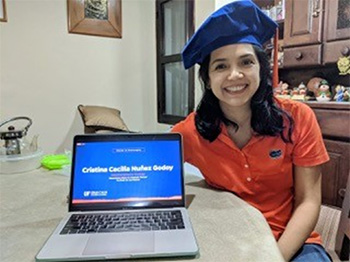 Cristina Nunez Godoy defended her Ph.D. dissertation entitled “Improving Payments for Ecosystem Services in a Global Deforestation Hotspot: The Gran Chaco of Argentina” in December 2020. She has been awarded a joint postdoctoral position with Argentine’s National Scientific and Technical Research Council (CONICET) and the Catholic University of Salta (UCASal). Cristina will be working with private landholders, local and state governmental and non-governmental agencies, research scientists, and academics to promote the voluntary conservation of the Chaco Forest of Argentina. Cristina received her Ph.D. from University of Florida’s School of Natural Resources and the Environment.
Cristina Nunez Godoy defended her Ph.D. dissertation entitled “Improving Payments for Ecosystem Services in a Global Deforestation Hotspot: The Gran Chaco of Argentina” in December 2020. She has been awarded a joint postdoctoral position with Argentine’s National Scientific and Technical Research Council (CONICET) and the Catholic University of Salta (UCASal). Cristina will be working with private landholders, local and state governmental and non-governmental agencies, research scientists, and academics to promote the voluntary conservation of the Chaco Forest of Argentina. Cristina received her Ph.D. from University of Florida’s School of Natural Resources and the Environment.
Innovative field biology premium awarded to Alejandro Pietrek for research in the high Andes
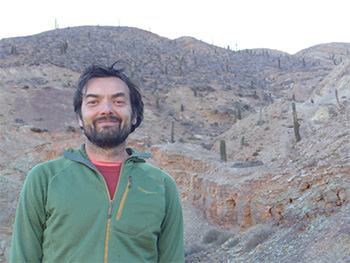 UF Southern Cone alumnus, Alejandro Pietrek, is among the first 5 field biologist awarded $100,000 each by the Maxwell/Hanrahan Foundation. This foundation, which made its first awards in 2020, supports innovative people working in field-based science. Alejandro received this award for his research on climate change and conservation of birds and mammals in the high Andes of northern Argentina. He currently is a research scientist with Institute of Bio and Geosciences of the National Science Council of Argentina (CONICET), Salta, Argentina.
UF Southern Cone alumnus, Alejandro Pietrek, is among the first 5 field biologist awarded $100,000 each by the Maxwell/Hanrahan Foundation. This foundation, which made its first awards in 2020, supports innovative people working in field-based science. Alejandro received this award for his research on climate change and conservation of birds and mammals in the high Andes of northern Argentina. He currently is a research scientist with Institute of Bio and Geosciences of the National Science Council of Argentina (CONICET), Salta, Argentina.
UF Southern Cone alumnus Marcela Marquez Garcia to study collaborative action for urban wetlands conservation in the south of Chile
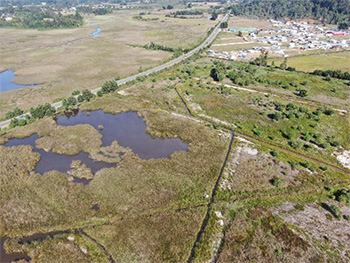 News from Marcela: “I was awarded a competitive postdoctoral grant funded by the scientific Chilean agency FONDECYT to study collaboration processes and collective action for urban wetlands conservation in the south of Chile. I'll focus on the city of Valdivia, where I currently live, to understand social practices and socio-ecological transformations in different wetlands within the city. I'll be conducting this interdisciplinary research at the Rio Cruces Wetland Center, Universidad Austral de Chile. This is a 3-year project, and I am very excited about it. I'll be starting mid-April 2021.” Marcela is an adjunct professor in the Instituto de Conservación, Biodiversidad y Territorio, Faculty of Forest Science and Natural Resources, Universidad Austral de Chile and advisor in human dimensions of conservation to the Centro de Humedales Río Cruces.
News from Marcela: “I was awarded a competitive postdoctoral grant funded by the scientific Chilean agency FONDECYT to study collaboration processes and collective action for urban wetlands conservation in the south of Chile. I'll focus on the city of Valdivia, where I currently live, to understand social practices and socio-ecological transformations in different wetlands within the city. I'll be conducting this interdisciplinary research at the Rio Cruces Wetland Center, Universidad Austral de Chile. This is a 3-year project, and I am very excited about it. I'll be starting mid-April 2021.” Marcela is an adjunct professor in the Instituto de Conservación, Biodiversidad y Territorio, Faculty of Forest Science and Natural Resources, Universidad Austral de Chile and advisor in human dimensions of conservation to the Centro de Humedales Río Cruces.
Women’s Network in Conservation of Latin America and the Caribbean (LAC) surpasses 900 members and launches Women’s Agenda
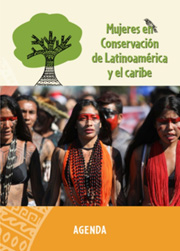 The Women’s Network, which aims to promote gender equality in conservation in Latin America and the Caribbean, now has over 900 members in 28 countries. This network was born out of a workshop held at the University of Florida in 2015 sponsored by UF’s Southern Cone Conservation Leadership Initiative, Tropical Conservation and Development Program, and the US National Science Foundation.
The Women’s Network, which aims to promote gender equality in conservation in Latin America and the Caribbean, now has over 900 members in 28 countries. This network was born out of a workshop held at the University of Florida in 2015 sponsored by UF’s Southern Cone Conservation Leadership Initiative, Tropical Conservation and Development Program, and the US National Science Foundation.
Older News
- UF Southern Cone alumni instrumental in developing regulations to protect urban wetlands in Chile!
- UF Southern Cone alumnus Eduardo Silva-Rodriguez invited to provide technical expertise to the House of Representatives of Chile regarding the impact of dogs on wildlife and livestock in Chile.
- UF professor Joel Correia visited Salta, Argentina, and traveled with UF Southern Cone alumnus and PhD student to the Argentine Chaco Forest
- SCCL alumnus, Alejandro Pietrek, has recently initiated research on the effects of climate change on birds of the high Andean lakes of northern Argentina
- Graduate student Clara Mosso awarded a National Geographic Explore's Grant for master's research in Tierra del Fuego, Argentina
- UF Southern Cone alumnus Tania Villaseñor awarded the prestigious L’Oreal for Women in Science Fellowship
- UF Alumni Mauricio Nuñez-Regueiro and Alejandro Pietrek obtain research positions with the National Scientific and Research Council (CONICET) of Argentina
- SCCL alumni participate in the 12th Gender Summit
- SCCL alumnus brings ecotoxicology to the forefront of wildlife conservation in the Southern Cone
- Southern cone students and alumni lead workshops for women in environmental sciences and sustainability in Ecuador and Argentina
- Addressing the gap between science and conservation practice in the Southern Cone

